
At the end of the day, Instagram is all about the visuals. The quality of your photos will be the differentiating factor when it comes to gaining Instagram followers, getting them interested in your brand and what it’s about, and showing off the human side of your business.
But the hard work doesn’t end once you’ve taken that beautiful photo and edited it to perfection. The caption of your post is where you can give a voice to that visual content.
It’s where you can explain what the photo is about, tell your followers to take action, or crack a joke that makes your content all the more delightful and shareable.
If you think of the caption on your Instagram posts as an afterthought, then you’re losing out on an opportunity to engage and delight your followers in ways you can’t with just a visual. Here are some tips to help you write better Instagram captions.
8 Tips for Writing Great Instagram Captions
1) Write several drafts first.
Ever thought of the perfect joke after it was a liiiittle too late to tell it? We’ve all had a similar feeling when we come up with the perfect Instagram caption once we’ve already published the post.
The lesson? Don’t rush the process. Instead, write a few ideas for captions down, sit on them for a bit, poll coworkers on which one is best, and generally take your time.
You might be asking yourself at this point, “But aren’t timeliness and chronology important on Instagram?” They can be, depending on the subject of your post. For example, professional Instagrammer Patrick Janelle says he uses Instagram as a kind of chronological journey of his activities and lifestyle. He likes to post in real time to document what he’s doing at a given moment.
But thanks to the impending Instagram feed algorithm change, the level of engagement your posts receive will soon matter more than chronology. Soon, our Instagram feeds will be ordered to show the moments Instagram thinks we’ll care about the most. The visibility of your posts in your followers’ feeds will depend on the number of Likes and comments a post has, your relationship with the user posting, and other factors.
That’s why it’s important to take your time constructing a great caption that’ll keep your followers around, delight them enough to share with their friends, and encourage them to engage with your content.
2) Front-load the important stuff.
The maximum character count for an Instagram caption (2,200 characters) is basically a formality. But the important thing to note is that captions cut off in users’ feeds after three to four lines of text.

That doesn’t mean you should keep your captions super short so users can see 100% of it without having to click “more.” Instead, frontload your captions with the important content or text calls-to-action — and leave any hashtags, @mentions, or extraneous information for the end.
Here’s an example of an enticing, front-loaded caption from coffee-based skincare company Frank Body:
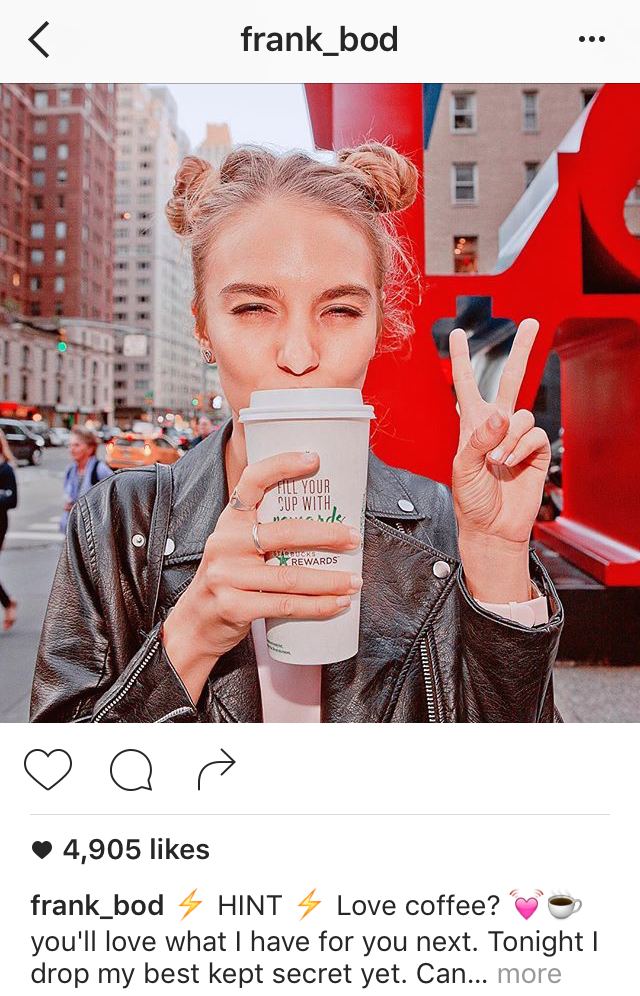
3) Include a call-to-action.
The best way to increase the shareability of your Instagram post and engage your followers is to have some sort of call-to-action in the captions of your photos. That means using action verbs to prompt people to do something, instead of just passively scrolling by. We found that verbs generate more shares on Twitter than nouns and adjectives — the same can be true for Instagram.
For example, you might say, “double-tap if you find this funny” or “share your story in the comments.”
Here are a few other action-based ideas to get you started:
Ask a question.
Encourage people to comment with their own experiences. You might be able to draw on these experiences to shape your Instagram strategy moving forward, or to come up with new content ideas. To increase engagement and delight your followers even more, respond to users’ answers to make it like a conversation.
H&M: “All you need for a weekend get-away. Where would you go?”

Lorna Jane: “Be you, everyone else is taken. Today’s inspo inspired by our leading lady @ljclarkson – how are you finding your BELIEVE today?”
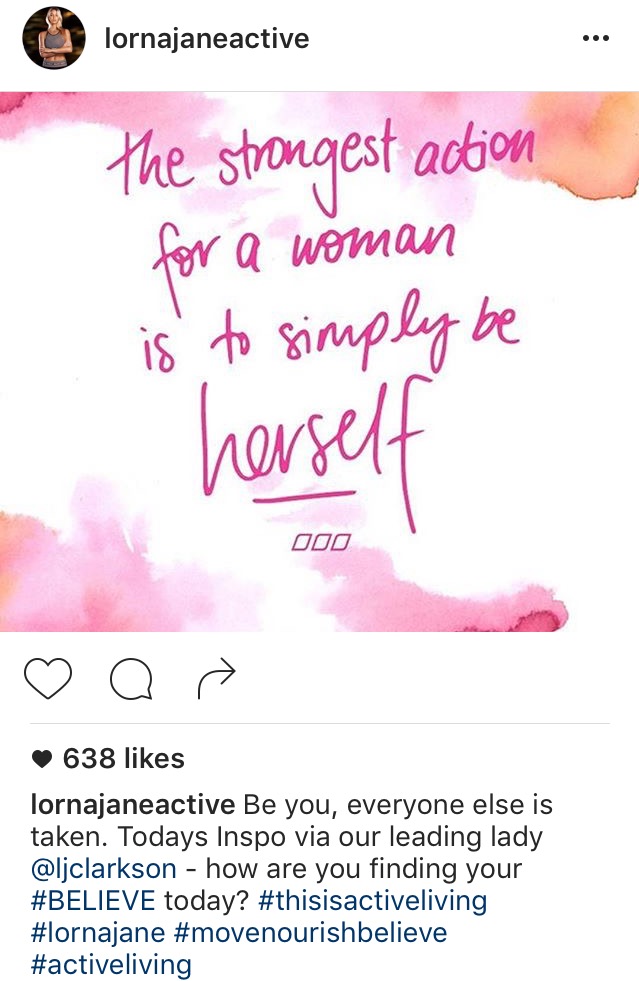
Direct people to a link in your bio.
Clickable URLs aren’t allowed anywhere except the single “website” box in your bio. That’s why optimized Instagram profiles update that URL frequently to point to their latest blog content, YouTube videos, products, or offers — and then refer to that link in their Instagram captions.
For example, are you running a contest, or want to increase subscribers to your blog? Just change the link, and then post a photo that mentions the new link in its caption.
Pro tip: Use shortened links that include UTM tracking codes so you can see how much of your traffic came from your Instagram page. (Learn how to create UTM codes to track your URLs here.)

To change the link in your bio, go to your profile page and click “Edit Profile.”

Then, simply insert the URL of your choosing into the URL box.
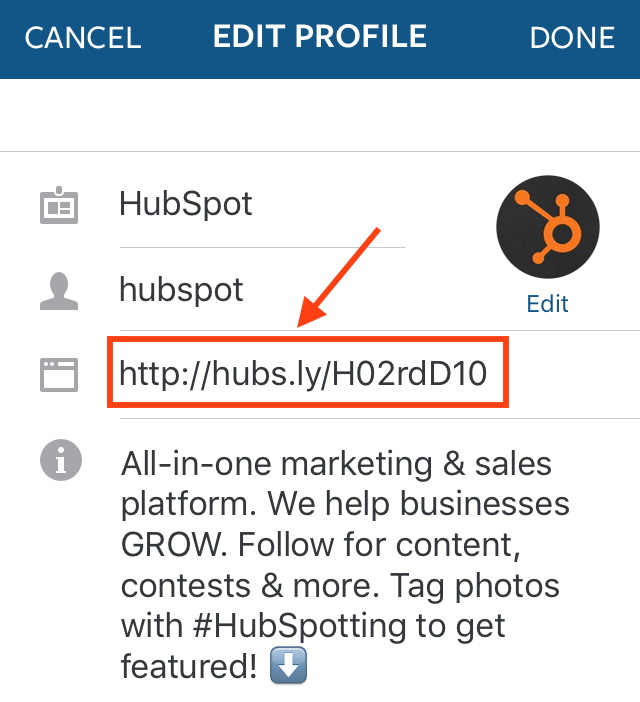
Invite people to tag their friends.
Encourage your followers to share your post with friends by inviting them to tag their friends. Here are a few examples of fun, clever ways brands have asked followers to tag friends.
Frooti: “It’s scrabble day! Tag some friends you’d like to play with.”

H&M: “Planning for a luxe escape with your bestie? Tag your travel partner in crime!”

HubSpot: “Coffee with coworkers make Friday mornings that much brighter. Tag your office coffee buddy – and better yet, take a break!”

Invite people to enter a contest.
Contests are great for increasing engagement and brand exposure on Instagram.
Simply invite people to post their own pictures and tag them in the caption using a hashtag, like BuzzFeed Tasty does below.
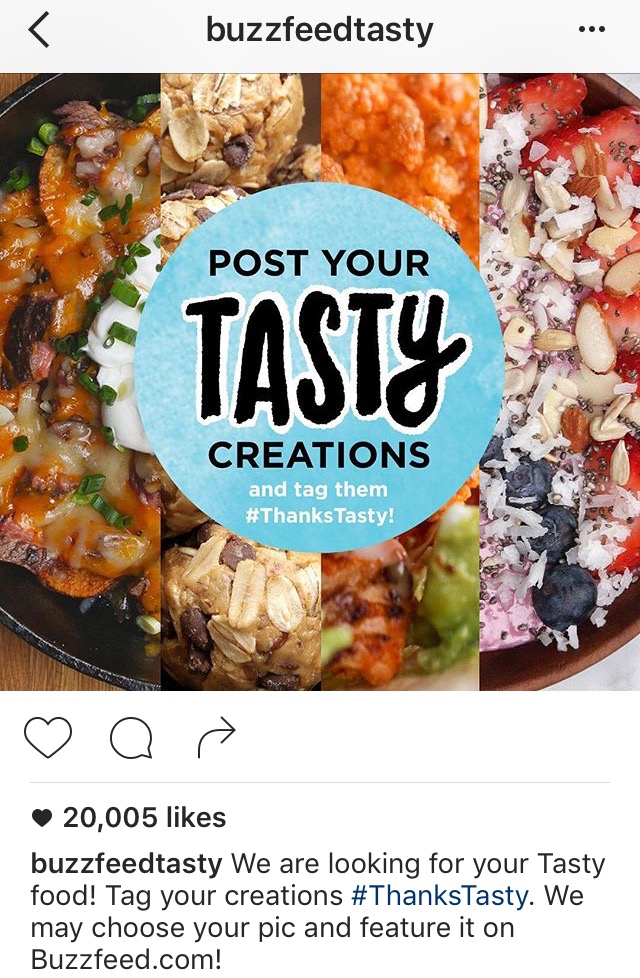
Consider including the contest’s official rules in your caption for folks who are interested, and even a link in your bio.
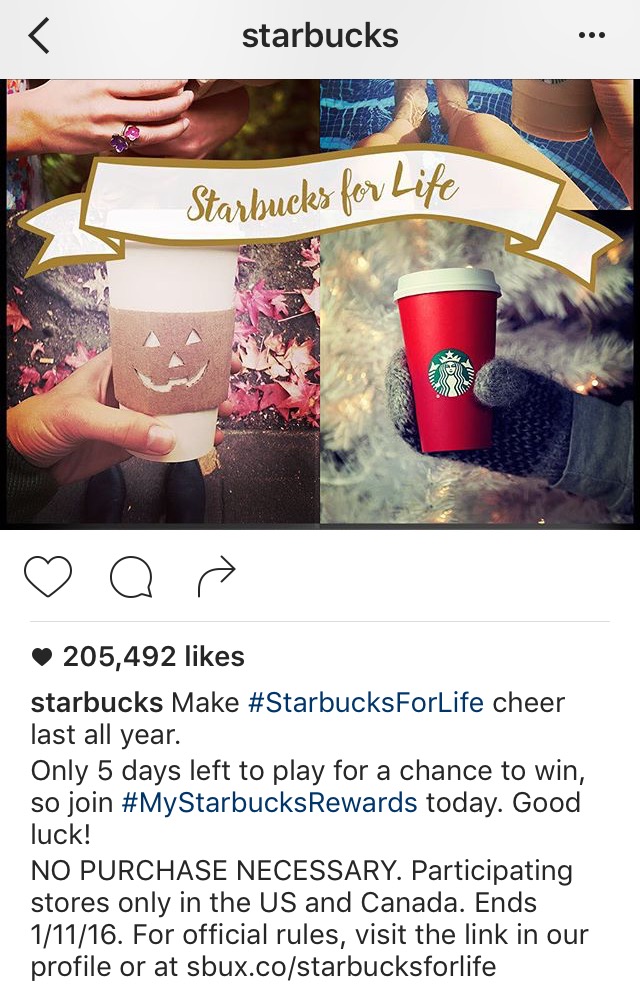
4) Limit yourself to 0-4 hashtags.
On Instagram, a hashtag behaves the same way as it does on Twitter and Facebook: It ties the conversations of different users into one stream. As long as your account is public, anyone who does a search for that hashtag may find your Instagram post. (Read this blog post to learn more about how hashtags work on Instagram, Twitter, and Facebook.)
Hashtags are great for connecting users who aren’t otherwise connected to one another, but who are talking about — and interested — in the same topics, events, brands, and so on. They’re also a great way to add some fun and coy humor to your posts, like FOMU did below.

But: Use hashtags sparingly.
Some Instagram users include a string of searchable hashtags as a way to get more followers — but the fact is, it looks spammy to the followers you do have. If you use a ton of hashtags, people will notice, and they will think it’s lame. Limit your hashtags to three or four, tops.
And remember, you don’t have to include any at all if you don’t want to. You don’t need a hashtag to have an awesome Instagram caption. Here’s an example of a good caption with no hashtag from Starbucks:
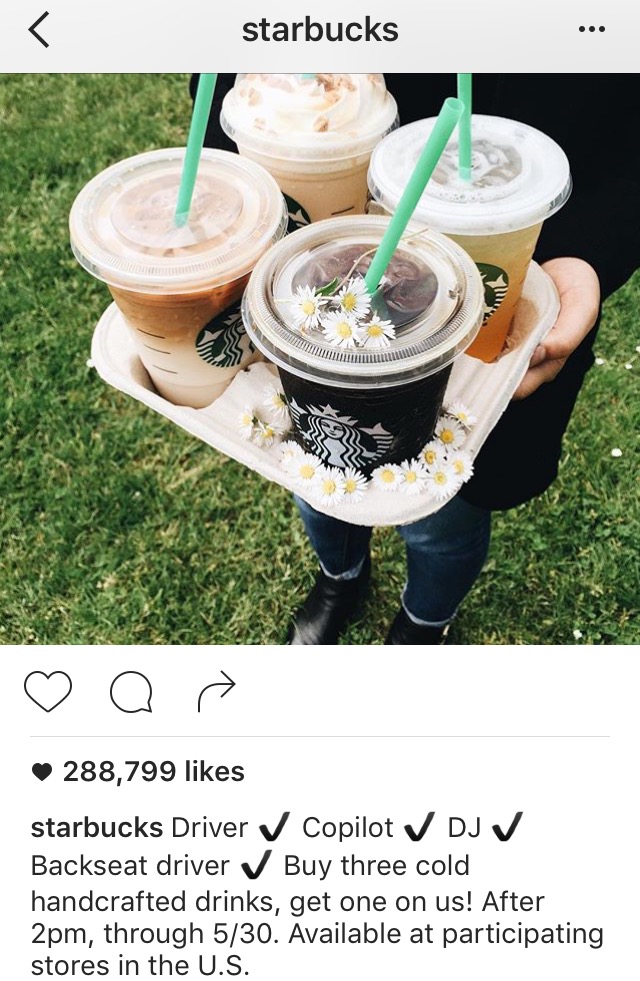
Use hashtags at the end of your caption.
Unless the hashtagged phrase fits naturally into a sentence, don’t list any hashtags until the very end of the caption. That way, the part of your caption that’s more appealing to humans will come first, making it more user-friendly.
Plus, if your caption is long enough to get cut off, the hashtags that are there to connect people (as opposed to delight people) will be hidden. So the hashtags in this caption:
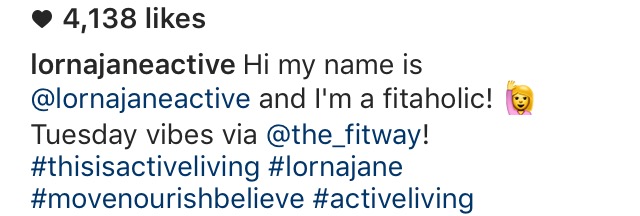
Will be hidden from folks scrolling by in their Instagram feeds — which is totally fine, since they’re just there for search reasons.

Pro tip: Need inspiration for a hashtag that’s already popular? Instagram will suggest hashtags to you based on their popularity when you open up a new post and type out the # symbol followed by an incomplete search. Here’s an example of that in action:
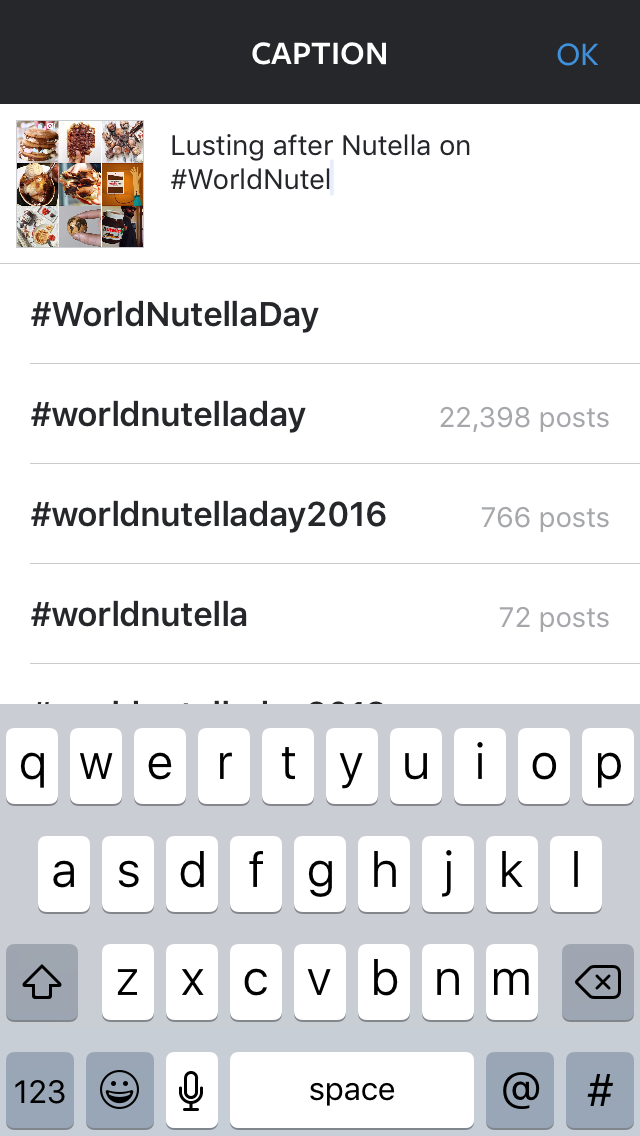
5) Meld your brand voice with Instagram’s lighthearted tone.
Every social network has a different tone that works best. While serious, jargon-heavy copy may work well on LinkedIn, for example, that same copy won’t work as well on Instagram. The best Instagram posts tend to have a lighthearted, fun tone, showing off the more authentic, human, and personable side of brands.
That’s why you’ll want to adapt your brand voice for Instagram’s more lighthearted tone. This’ll be easier for brands whose brand voices are already lighthearted and fun, like Wistia’s.

For others with a more serious brand voice, find a balance between sincerity and relatability.

Being relatively consistent in your Instagram voice can help you build your brand on the channel. For example, think about how long you’ll typically want most of your posts to be. Do you want to be a storyteller who writes a paragraph or more?
Or do you need the space to write out instructions, or a recipe?
Or do you favor a minimalist approach with just a few words?
When in doubt, be punny. Cleverness tends to perform quite well on social media, especially Instagram. People love when brands crack a joke or include a play on words. JetBlue, for example, is always an excellent source of puns:

Here’s another one from Chobani:

If you’re experience caption writer’s block, the Wall Street Journal‘s Elizabeth Holmes suggests playing a word association game or brainstorming with a friend.
6) Use emojis.
Emojis, the cartoon-like emoticons available to most smartphone users, can add some personality to an Instagram caption. That’s why a lot of brands use them in their captions — even the more “serious” brands.
There are a lot of different ways to use emojis in your posts. For example, you can use them at the beginning of post to catch people’s eye, like this:
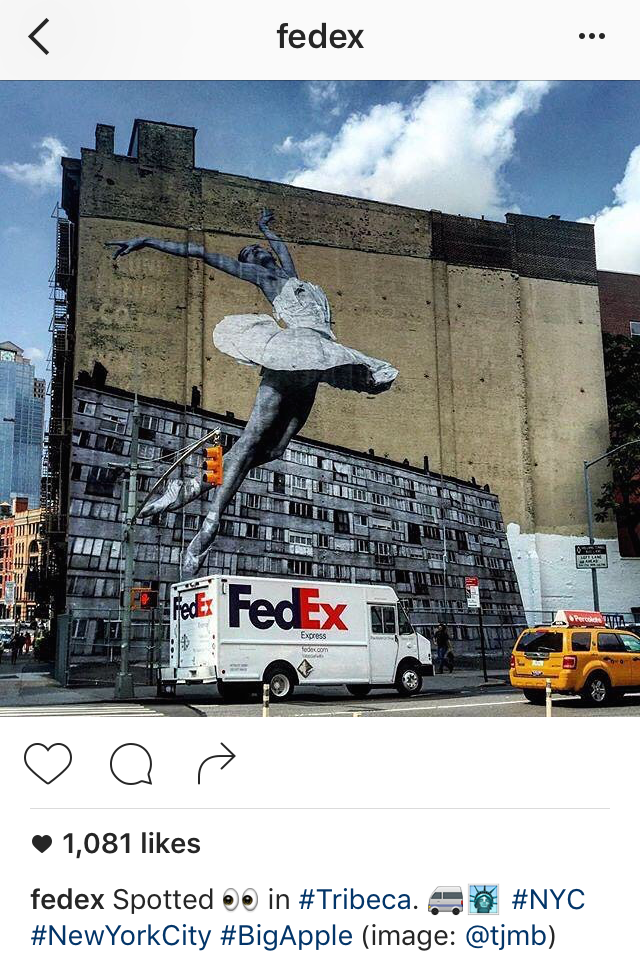
You can also use them in the middle of sentences to replace words, or at the end of a post as a sort of “punchline,” like this:

7) Cross-promote your other social channels.
You can also use your caption to cross-promote your other social media accounts. This is a great way to let your followers know where else on social media they can find you — so that your Instagram followers can become your Twitter followers, your Facebook fans, your Snapchat audience, and so on.
For example, you might promote a campaign that’s taking place on another channel, like Coca-Cola did here:
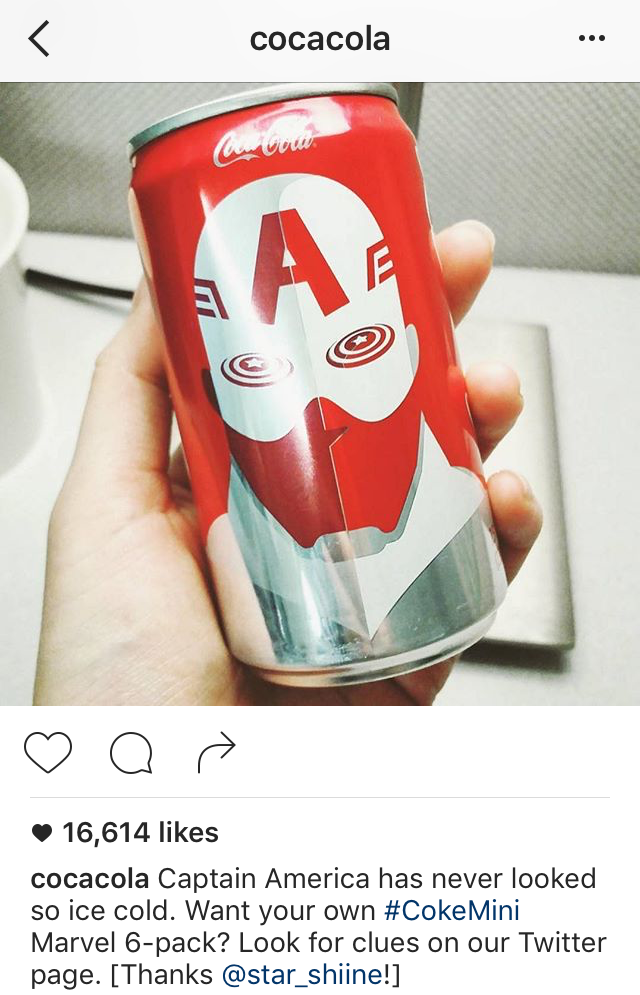
Pro Tip: If you have a Snapchat account, Snapcodes are perfect for cross channel promotion on your other social media profiles. Every Snapchat user has a unique Snapcode, which is an image that looks like the Snapchat logo but with a unique pattern of dots. To follow you on Snapchat, all users will have to do to is open the Snapchat app, take a photo of your Snapcode, and tap their screen.
Here’s an example from WeWork:
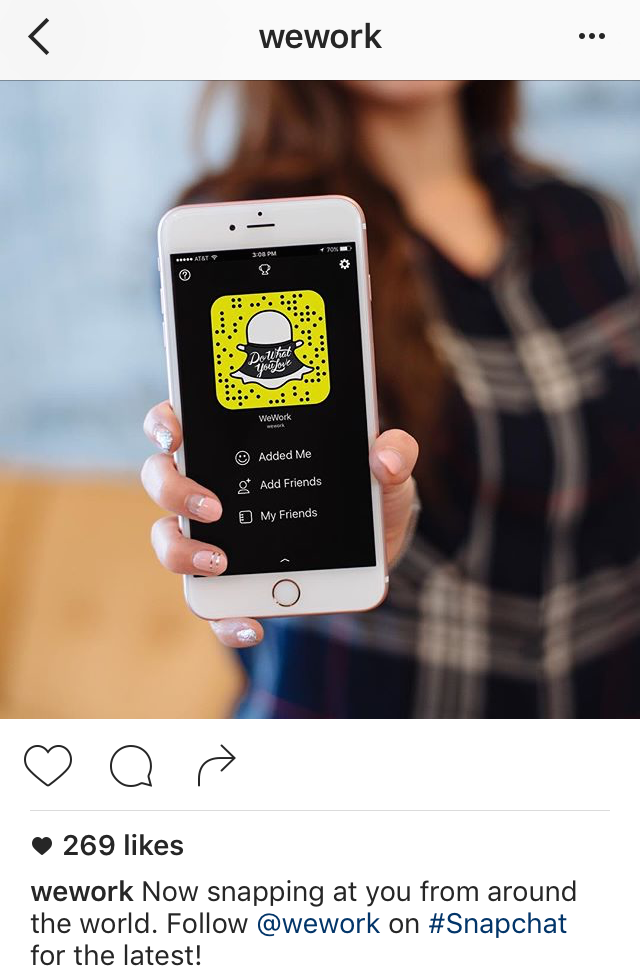
8) When in doubt, keep it brief.
Depending on your audience, your captions might need to be longer than a few words or a sentence. For example, if you’re a food company, you might post entire recipes in your captions — and that’s OK, as long as you’re front-loading the caption with the most important information (like the name of the recipe) so it doesn’t get cut off.
But if you’re not sure what your brand voice is yet, a good rule of thumb is to keep it brief. Some of the best Instagram captions are short punchlines, or in some way make their point quickly and let the visual content do most of the talking.
Coca-Cola: “Goodbye, tan lines. Hello #SpringBreak.”

WeWork: “Every day.”
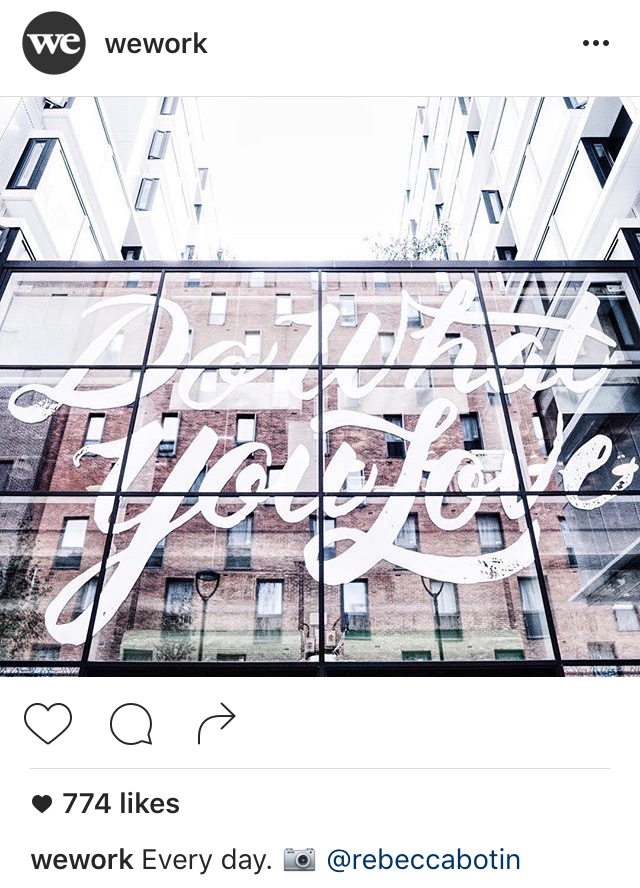
BuzzFeed Tasty: “Whip it good.”
As you test out different types of posts on Instagram, keep track of how different post types work — including your captions. Instagram doesn’t have a whole lot to offer in terms of analytics, so you’ll have to do this manually. Try listing each post on a spreadsheet and keeping track of its URL, the time it was posted, how many Likes and comments it got, and the types of feedback you’re getting from your followers.
What are your tips for writing the perfect Instagram caption? Share them with us in the comments below.


